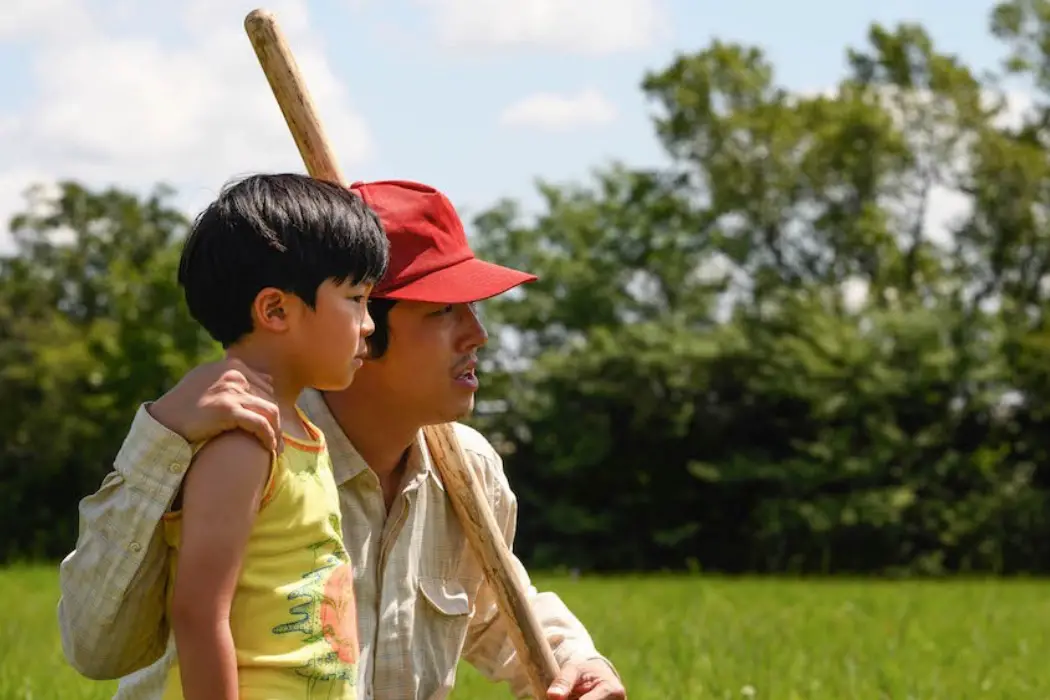Sundance 2020: MINARI

Janet is a writer based in Salt Lake City. A…
Well, I had to save the best for last. Not only do I think that this film permeates with wonderful characters, acting, and cinematography, but it also carries an achingly honest story of the American Dream and immigrant experience. As a second-generation Korean-American kid, this film resonated with me deeply. It’s a mature, conscientious, and introspective project that is rooted in director and writer Lee Isaac Chung’s childhood memories.
Seeing this film in Park City among a predominantly white audience who cried and laughed was an amazing experience. It shows the need and essence in creating cinema around people of color and illustrating the complexities of navigating cultural identity. Hollywood and much of society, has not understood the specificity and existence of the second-generation experience – having immigrant parents and living in the misty space between being American and the ethnicity that envelopes your life at home.
Chung brings this experience onto the big screen authentically with openness. The beauty of Minari is that it doesn’t blatantly point to a family’s cultural differences nor the challenges of fitting into a new community. We’ve seen this already. Oftentimes, POC narratives get pretty explanatory, and they try to cater and please audiences that don’t look like themselves. There’s social and cultural commentary (usually as a way for comic relief) peppered throughout the story which loses its authenticity.
Staying true to his past and story, Chung meditatively displays the challenges of keeping a family together and thriving in the midst of shocking and taxing transitions. It’s all done with grace and modesty. Chung doesn’t give an explanation to their lives or differences. He doesn’t point to the obvious that brings their cultural differences in the spotlight. It simply is what it is, and that’s the beauty of Minari – it unassumingly illustrates a Korean-American family’s experience. It’s humble and refreshing.
Now in his forties and a father himself, Chung fleshes out these memories. He kindles familiar emotions and a wise perspective on the essence of disappointment, family, and community. This bilingual family drama illustrates the anxieties of change, a parent’s selfishness, and the grueling and unforgiving work involved in achieving the American Dream.
Navigating Taxing Transitions With Family
Minari follows a Korean-American family in the 1980s whose father, Jacob (Steven Yeun) moves them from California to rural Arkansas to build a farm. Believing that the soil is richer and more abundant in Arkansas, he moves his family. When the family arrives at their mobile home, their mother, Monica (Yeri Han), is appalled to find that their new home is in the middle of nowhere.
She doesn’t understand why they moved away from the city for this. Not to mention, the nearest hospital is an hour away which serves as a huge disadvantage considering that their youngest, seven-year-old, David (a wonderful Alan Kim), has a weak heart that can give out any moment.

It’s during these first few minutes of the film where we sense Jacob’s self-serving character; we know it’s something that will prove dangerous if it isn’t simmered down sooner. Monica and Jacob have made an honest living separating poultry by gender. And Jacob is determined in doing and creating something larger – growing a successful farm on untapped soil.
As he lectures David to use his mind and not pay for anything that he can get for free, we sense Jacob’s relentless drive in making something of himself on their farmland. This often means forgoing the wellbeing of his family. Soon enough, money gets short as Jacob’s obsession heightens.
All the while, Monica’s mother (Yuh Jung Youn) moves in with them from Korea. To us, she’s a cool grandma. She’s got a witty sense of humor and teaches her grandchildren how to play Godori (a Korean card game) and often teases David. But to young David, she’s not a “real grandma”. She doesn’t fulfill his Americanized understanding of what a grandmother should be – she doesn’t bake, she swears, she “smells Korean,” and she brews a gross herbal drink every morning for them.
Much of the film navigates through journeys of love and affliction between its characters. Between Monica and Jacob and David and his grandmother. In a way, David’s evolving relationship with his grandmother helps him to make sense of the world around him and the challenging circumstances his parents face.
Specificity in Storytelling
It’s an incredibly refreshing experience seeing the family’s story flesh out through the eyes of young David. Him and his sister, Anne (Noel Kate Cho) are far too young to fully comprehend the complexities that envelope their lives. They’re in an age where their lives are still filled with whimsy and wonder. And in a way, this makes for astute and conscientious storytelling on Chung’s part.
Through their young age and perceptions, Chung is able to tacitly convey feelings and circumstances that convey the family as unapologetically themselves. There isn’t any direct cultural commentary; it doesn’t try to be anything more than what it naturally is. Chung simply shows David and his family’s experience for what it is: specific and real.
Rooted in Chung’s memories of his childhood, the film carries beautiful symbolism. It isn’t symbolism that’s dramatized or obvious. It delicately speaks to the family’s new life and young David’s naiveness and fascination of the new world around him. His grandmother shows him minari, a Korean herb that grows abundantly while he introduces her to Mountain Dew (or as he calls it, “water from the mountains”).
Considerable Depth in Characters, Especially Monica
The film instills its characters with silent intricacies that poignantly portray the human condition. Especially in the adults, they each undergo their own personal journeys of change, realizations, and confrontations. Yeun meticulously portrays a father who fails to see beyond his own dreams. But rather than simply displaying him as an antagonizing figure, the actor sprinkles the right dose of anguish in Jacob that kindles the right kind of sympathy that he needs to craft a story rooted in singularity.
Monica is the heart of the film. She embodies the trepidations of a woman and a mother starting from scratch with two kids and a selfish husband. Han does a phenomenal job in portraying the anxieties of change and trying to keep the family together. The burden primarily rests on her shoulders.
Perhaps the most relatable and human aspect of her character is the desire for connection and community. Stranded in the middle of nowhere in a predominantly white town, speaking minimal English, Monica tries to seek a sense of belonging by attending their local church. I was struck by how accurate this was – the way faith plays such a significant role in Korean culture and how it’s used to foster a sense of community.
The amount of depth and range that the actress weaves into Monica is just right, and she brings the character to life with such humility, honesty, and strength. There’s a scene where Monica and Jacob are having a profound conversation about their marriage and family, and to say the least, Han knocks it out of the park.
Crafting Soft Light and Delicate plots in a Different World
Cinematographer Lachlan Milne (Hunt for the Wilderpeople) delicately and beautifully captures the inquisitive nature of David’s experience of observing and living in a new place. The soft light and delicate colors illuminate David’s heartwarming relationship with his grandmother along with the glimmer of hope that the family, mostly Jacob, heavily and dangerously hang onto. And this paradoxically brews an elusive perspective on the American Dream. The wondrous visuals and melodic score (Emile Mosseri, The Last Black Man in San Francisco) are very dreamlike that they encapsulate both the ambition and elusivity of the American Dream.
Minari: Conclusion
Minari brings an honest story of family, love, selfishness, and humility. I saw my life in many ways through this film, and for that, I know that this film is true to Chung’s and the Korean-American experience. Chung doesn’t hold back, and we can’t help but have a fervent appreciation for Minari. This film does a respectable job of not trying to be anything else but completely itself.
Does content like this matter to you?
Become a Member and support film journalism. Unlock access to all of Film Inquiry`s great articles. Join a community of like-minded readers who are passionate about cinema - get access to our private members Network, give back to independent filmmakers, and more.
Janet is a writer based in Salt Lake City. A strong advocate for underrepresented voices, she believes cinema is a transformative medium that challenges assumptions and creates diverse conversations.













